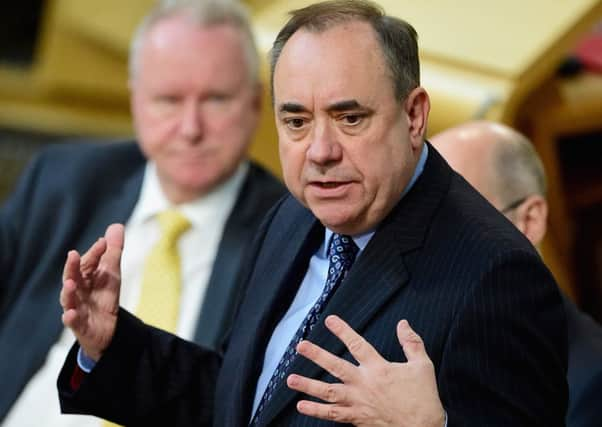Leaders: Writing off poll tax debt is good for Scotland


It resulted in many opting to avoid the tax by de-registering from the electoral roll. Few suspected that re-registration more than 20 years later would trigger demands for poll-tax repayment. Indeed, some local authorities have written off the debt. Now First Minister Alex Salmond has stepped in to say the Scottish Government will bring in new laws to stop councils pursuing people for poll tax arrears.
The move has immediately been challenged. The Convention of Scottish Local Authorities says some £425 million of poll-tax debt remains unpaid and its president, David O’Neill, protests that councils had been under, “a very strict obligation” to collect every penny of outstanding debt. Indeed, they had previously been told that they had no right to demand additional money from government until they did so.
Advertisement
Hide AdAdvertisement
Hide AdAlex Johnstone, Conservative representative on Holyrood’s welfare reform committee, says the move is unfair to those Scots who paid the tax in good faith, subsidising those who could afford to pay but chose not to. Such an approach to tax collection, he added, might beg the question why people should pay tax at all.
Two cardinal points barely need repetition. First, people should pay their debts. But second, if a tax is perceived by a large number of people to be unfair, there will be immense problems in securing its collection.
The bills for the poll tax, coinciding as they did with a rates revaluation, came as a shock to many. In both timing and concept – a binman and a millionaire paid the same amount – it was injudicious and iniquitous. Little wonder it was abandoned four years later.
The passage of more than 20 years since its withdrawal makes it no more acceptable. Those who de-registered because they would not, or could not, pay suffered disenfranchisement. This was a tragedy for democracy. Penalising people who chose to register to vote in the independence referendum with demands for payment now adds a further injustice.
That Scots coaxed back into the democratic fold should be punished for so doing is grotesque and unacceptable.
Mr Salmond may be accused of playing to the gallery in settling an old political score against the Conservatives. But he is right to act as he did. The poll tax is a stain on our history, and until last month its effects were still with us in a lack of engagement with the political process by a significant section of the population.
It is time to turn the page. Massive re-engagement with the political process is something to celebrated. It bodes well for the future of our country. That is surely more important than the collection of a tainted debt.
Fly in the ointment
Advertisement
Hide AdAdvertisement
Hide AdHere’s a familiar refrain – scientists predict a bumper crop of midges for next summer. It may raise a wry smile and shift a few “midge eaters” from the garden centres, but the general response will be a weary resignation.
The truth for (literally) hard-bitten Scots is that every year seems to be a bumper year for midges. No summer passes without the folksy conversation pieces of farmers and, well, “midge-eater” manufacturers: “Aye, next summer will be a record for the midges”. But can anyone other than the experts really tell? One or two bites more or less means little. We will still be bitten.
The rationale for this latest prediction is that, according to the world’s leading expert on culicoides impunctatus – the scientific name for the Highland biting midge – the more midges there are to lay eggs at the end of the summer, the larger the first emergence will be the following spring.
Alison Blackwell, director of the splendidly-named Advanced Pest Solutions, which runs the Scottish Midge Forecast, said numbers were significantly higher at most of their trapping locations across Scotland this year, compared to last year.
But wasn’t this year a bumper year for midges? Readers will recall the warning back in March that midges were set to plague the Highlands in record numbers this year. The warm winter followed by wet and damp conditions just as midges are hatching could not be more perfect for the insect.
Let’s face facts. Every year, there are millions of them. Every year brings a nibbling invasion across our gardens. It’s part of the rich Scottish experience. Pass the calamine lotion, would you?